成人学位英语语法 语气
- 格式:doc
- 大小:65.50 KB
- 文档页数:9
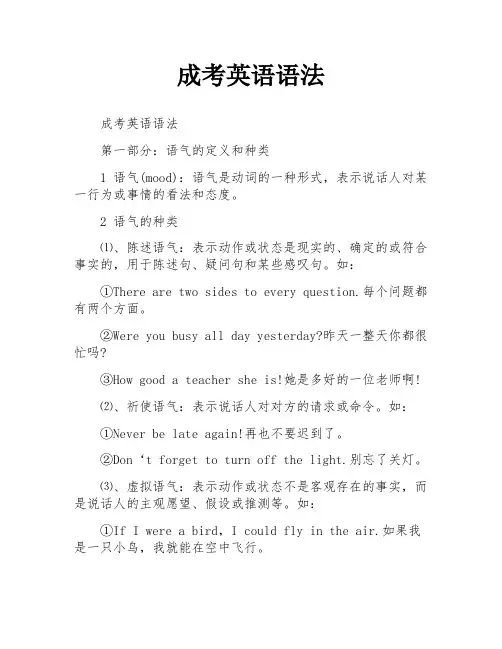
成考英语语法成考英语语法第一部分:语气的定义和种类1 语气(mood):语气是动词的一种形式,表示说话人对某一行为或事情的看法和态度。
2 语气的种类⑴、陈述语气:表示动作或状态是现实的、确定的或符合事实的,用于陈述句、疑问句和某些感叹句。
如:①There are two sides to every question.每个问题都有两个方面。
②Were you busy all day yesterday?昨天一整天你都很忙吗?③How good a teacher she is!她是多好的一位老师啊!⑵、祈使语气:表示说话人对对方的请求或命令。
如:①Never be late again!再也不要迟到了。
②Don‘t forget to turn off the light.别忘了关灯。
⑶、虚拟语气:表示动作或状态不是客观存在的事实,而是说话人的主观愿望、假设或推测等。
如:①If I were a bird,I could fly in the air.如果我是一只小鸟,我就能在空中飞行。
②I wish I coul d pass the examination.我希望我能通过考试。
③May you succeed!祝您成功!第二部分:简单句中的虚拟语气一、情态动词的过去式用于现在时态时,表示说话人的谦虚、客气、有礼貌、或委婉的语气,常用于日常会话中。
如:⑴、Would you be kind enough to show methe way to the post office?请你告诉我去邮局的路好吗?⑵、It would be better for you not tostay up too late.你最好别熬夜到很晚。
二、表祝愿。
1、常用“may+动词原形”表示祝愿,但愿,此时may须置于句首(多用于正式文体中)。
⑴、May good luck be yours!祝你好运! ⑵、May you be happy!祝你快乐!⑶、May you do even better!祝你取得更大成就!⑷、Mayyou have a good time. 祝愿你玩的痛快。
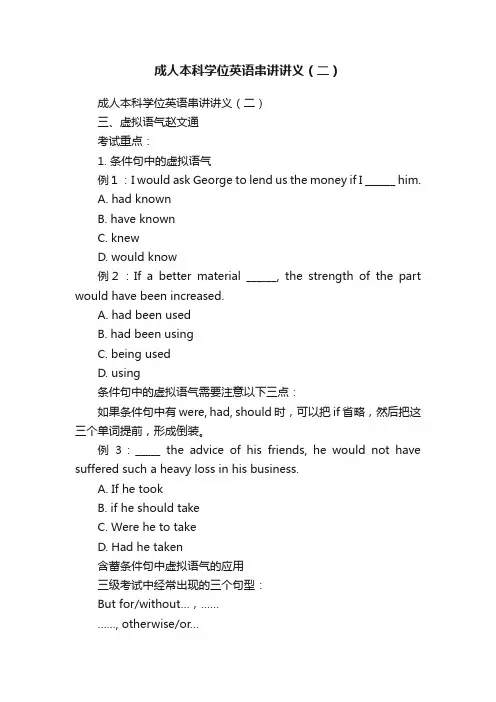
成人本科学位英语串讲讲义(二)成人本科学位英语串讲讲义(二)三、虚拟语气赵文通考试重点:1. 条件句中的虚拟语气例1:I would ask George to lend us the money if I ______ him.A. had knownB. have knownC. knewD. would know例2:If a better material ______, the strength of the part would have been increased.A. had been usedB. had been usingC. being usedD. using条件句中的虚拟语气需要注意以下三点:如果条件句中有were, had, should时,可以把if省略,然后把这三个单词提前,形成倒装。
例3:_____ the advice of his friends, he would not have suffered such a heavy loss in his business.A. If he tookB. if he should takeC. Were he to takeD. Had he taken含蓄条件句中虚拟语气的应用三级考试中经常出现的三个句型:But for/without…,…………, otherwise/or………, but/though….例4:But for your help, I _____ the work in time.A. did not finishB. could not finishA. will not finish D. would not have finished例5:Without electricity, human life _____ quite different today.A. isB. will beC. would have beenD. would be例6:He was very busy yesterday; otherwise he_____ to the meeting.A. would have comeB. would comeC. could comeD. had come例7:We would have made a lot of money, but we halfwayA. gave upB. had given upC.would give upD. were to give up错综时间条件句例8:If I were you, I would not have missed the film last night.2. (should )+动词原形在某些从句中的应用1)当宾语从句从的谓语是suggest, request, insist, desire , demand, propose, order, command, arrange等动词时,如: 例1:I suggested that we should go there on foot.注意:当insist表示坚持认为之意时, 不用虚拟语气,用陈述语气. 如:例2:The man insisted that he had never stolen the money2) It is ordered/desired/decided/requested/strange/important/natural/等后的主语从句中例3:It is desired that we should get everything ready tonight3) advice, idea, order, plan, demand, proposal, suggestion, reques t等名词之后的表语从句和同位语从句中.如:例4:My suggestion is that we should hold a meeting this evening3. wish后的宾与从句中应当用虚拟语气4. if only 引导的感叹句中5. as if/as though引导的状语从句中6. would rather后的句子的虚拟语气谓语动词用过去式7. it is (high) time that ….句型中, 从句的谓语动词用过去式四、非谓语动词1. 不定式不定式的逻辑主语例1:The road is wild enough for cars to pass by.例2:It is important for you to work hard.例3:It is kind of you to help me.不定式的时态和语态例4:The magnificent museum is said _____ about a hundred years ago.A. to be builtB. to have been builtC. to have builtD. to have being built使用不带to的不定式1)why not do表示委婉的建议例1:Why not_____Professor Li for help? He is kind-hearted and willing to help.A. askB. you askC. to askD. your asking2)使役动词have, make, let的后面接不定式做宾语补足语时,用省to的不定式。
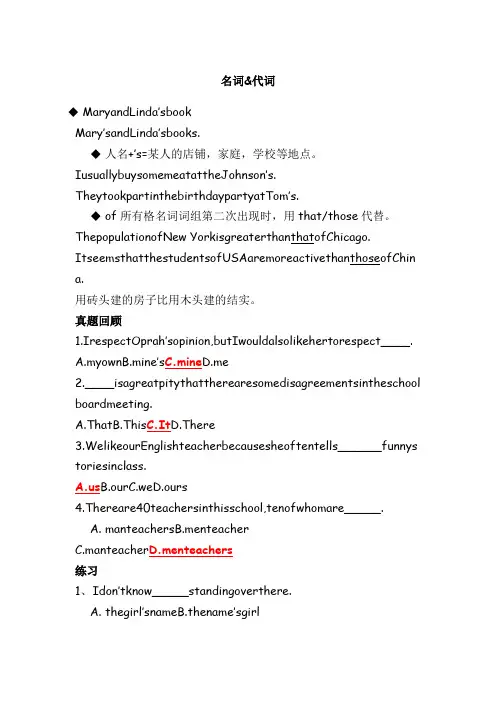
名词&代词◆MaryandLinda’sbookMary’sandLinda’sbooks.◆人名+’s=某人的店铺,家庭,学校等地点。
IusuallybuysomemeatattheJohnson’s. TheytookpartinthebirthdaypartyatTom’s.◆of所有格名词词组第二次出现时,用that/those代替。
ThepopulationofNew YorkisgreaterthanthatofChicago. ItseemsthatthestudentsofUSAaremoreactivethanthoseofChin a.用砖头建的房子比用木头建的结实。
真题回顾1.IrespectOprah’sopinion,butIwouldalsolikehertorespect____.A.myownB.mine’sC.mineD.me2.____isagreatpitythattherearesomedisagreementsintheschool boardmeeting.A.ThatB.ThisC.ItD.There3.WelikeourEnglishteacherbecausesheoftentells______funnys toriesinclass.B.ourC.weD.ours4.Thereare40teachersinthisschool,tenofwhomare_____.A.manteachersB.menteacherC.manteacherD.menteachers练习1、I don’tknow_____standingoverthere.A.thegirl’snameB.thename’sgirlC.thenameofthegirlD.th ename’sofgirl2.Today’slibrariesdiffergreatfrom_______.A.thepastB.thoseofthepastC.thatarepastD.thosepast3.Thepoliceinvestigatethe______aboutthebankrobbery.A.stander-byB.standers-byC.stander-bysD.standers-bys主谓一致1.两个或两个以上做主语的单数名词用and连接,谓语用复数.TomandDick___are____(be)goodfriends.但若表示一个集合体时则用单数。
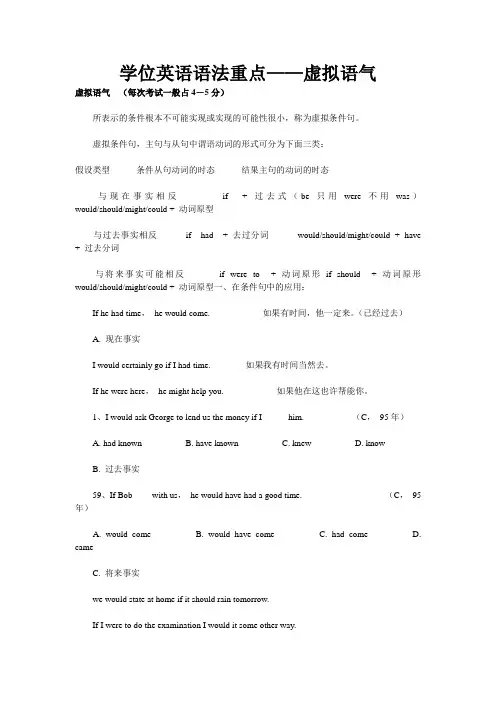
学位英语语法重点——虚拟语气虚拟语气(每次考试一般占4-5分)所表示的条件根本不可能实现或实现的可能性很小,称为虚拟条件句。
虚拟条件句,主句与从句中谓语动词的形式可分为下面三类:假设类型条件从句动词的时态结果主句的动词的时态与现在事实相反if + 过去式(be只用were不用was)would/should/might/could + 动词原型与过去事实相反if had + 去过分词would/should/might/could + have + 过去分词与将来事实可能相反if were to + 动词原形if should + 动词原形would/should/might/could + 动词原型一、在条件句中的应用:If he had time,he would come. 如果有时间,他一定来。
(已经过去)A. 现在事实I would certainly go if I had time. 如果我有时间当然去。
If he were here,he might help you. 如果他在这也许帮能你。
1、I would ask George to lend us the money if I _____ him. (C,95年)A. had knownB. have knownC. knewD. knowB. 过去事实59、If Bob____ with us,he would have had a good time. (C,95年)A. would comeB. would have comeC. had comeD. cameC. 将来事实we would state at home if it should rain tomorrow.If I were to do the examination I would it some other way.注意:⑴条件从句中,如果含有be动词、助动词、情态动词,had,should或动词to have,可省略if,要倒装,即把这些词放到主语前面。
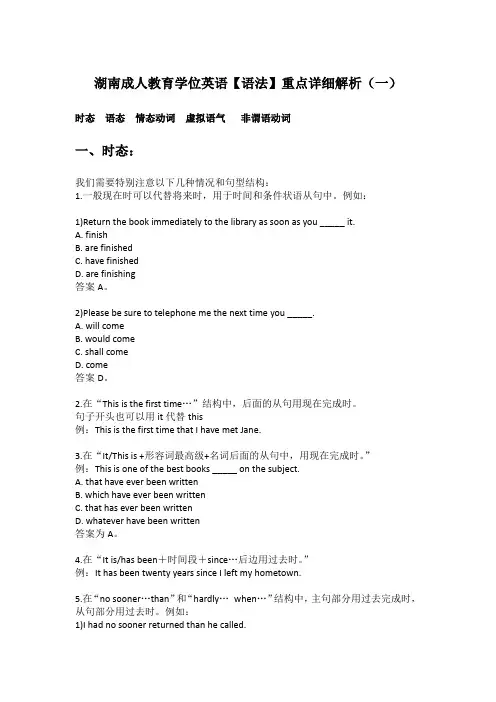
湖南成人教育学位英语【语法】重点详细解析(一)时态语态情态动词虚拟语气非谓语动词一、时态:我们需要特别注意以下几种情况和句型结构:1.一般现在时可以代替将来时,用于时间和条件状语从句中。
例如:1)Return the book immediately to the library as soon as you _____ it.A. finishB. are finishedC. have finishedD. are finishing答案A。
2)Please be sure to telephone me the next time you _____.A. will comeB. would comeC. shall comeD. come答案D。
2.在“This is the first time…”结构中,后面的从句用现在完成时。
句子开头也可以用it代替this例:This is the first time that I have met Jane.3.在“It/This is +形容词最高级+名词后面的从句中,用现在完成时。
”例:This is one of the best books _____ on the subject.A. that have ever been writtenB. which have ever been writtenC. that has ever been writtenD. whatever have been written答案为A。
4.在“It is/has been+时间段+since…后边用过去时。
”例:It has been twenty years since I left my hometown.5.在“no sooner…than”和“hardly…when…”结构中,主句部分用过去完成时,从句部分用过去时。
例如:1)I had no sooner returned than he called.2)We had hardly begun when we were told to stop.6.在“It is (high) time后边的从句中用过去时。
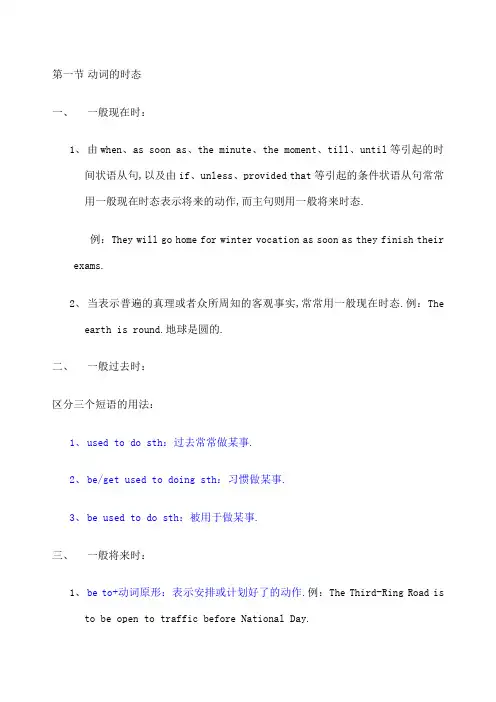
第一节动词的时态一、一般现在时:1、由when、as soon as、the minute、the moment、till、until等引起的时间状语从句,以及由if、unless、provided that等引起的条件状语从句常常用一般现在时态表示将来的动作,而主句则用一般将来时态.例:They will go home for winter vocation as soon as they finish their exams.2、当表示普遍的真理或者众所周知的客观事实,常常用一般现在时态.例:Theearth is round.地球是圆的.二、一般过去时:区分三个短语的用法:1、used to do sth:过去常常做某事.2、be/get used to doing sth:习惯做某事.3、be used to do sth:被用于做某事.三、一般将来时:1、be to+动词原形:表示安排或计划好了的动作.例:The Third-Ring Road isto be open to traffic before National Day.2、be about to+动词原形:表示即将发生的动作.例:The lecture is about tobegin.讲座即将开始.3、一些表示动作趋势,如开始、终结,以及一些表示动作方向,如往来的动词,常常用现在进行时态表示按照安排将于将来发生的事情,这类动词常见的有如:start, go, leave, come, arrive等.例:We are leaving for Beijing tomorrow.我们明天动身去北京.四、进行时态:重点区分when和while引起的时间状语的用法.When表示时间上的点,在考试中其引导的时间状语从句多翻译为“这时…”,主句多用进行时态;while引导的时间状语从句多翻译为“正当…时”,该从句用进行时态.例:One of the guards was sleeping when the general came in, which made him very angry.I fell and hurt myself while I was playing tennis.五、现在完成时:重点区分havehasbeen to:某人去过某地,表示一种经历,强调状态,可以和once, twice, often, never, ever连用;Havehas gone to:某人在去某地的途中或已在某地,强调动作.此句型不能与上述时间状语连用.例:He has gone to America.他已经去了美国.He has been to America twice.他去过美国两次.六、过去完成时:1、强调一个动作发生在另外一个过去的动作之前时,用过去完成时.2、It was the first/second/last time that…,在该句型,that从句用过去完成时态.七、将来完成时:常常标志性地由by、by the time、by the end of引起一个表示将来时间段的时间状语,主句用将来完成时态.第二节感官动词、使役动词的用法及英语中常考的两个句式结构一、感官动词的用法及其被动语态:在英语中,常见的感官动词有“五看二听一感觉”see、watch、look、notice、observe;hear、listen to;feel,在主动语态中用动词原形或现在分词作宾补,如see sb do/doing sth,改为被动语态时则要加to,如sb be seen to do sth.二、使役动词的用法及其被动语态:在英语中,常见的使役动词有make、let、have,在主动语态中用动词原形做宾补,如make sb do sth,改为被动语态时则要加to,如sb be made to do sth, 两种形式都表示使/让某人做某事的意思.例:We were made to study hardy.我们被要求努力学习.三、英语中常考的句式结构一:sth need/ want/ require doing 某物需要…=sthneed/want/require to be done此句式主语为物例:My room is a mess. It needs tidying up整理.四、英语中常考的句式结构二:have/get sth done 请/让别人做某事have/get后接宾语为物例:I have taken many photos. I’m going to get the film developed.五、情态动词的被动语态,其构成为:情态动词+be+过去动词.例:The work must befinished before lunch. 这项工作必须在午饭前干完.第三节情态动词常见的情态动词有can、could;may、might;must、need;should;ought to,对于情态动词常考其两方面的内容,一是情态动词用于推测句型,二是情态动词用于虚拟语气该部分的讲解放在虚拟语气一、情态动词用于对现在内容推测的常见句型有:1、Can/may do sth:表示对现在内容的可能性的推测;2、Must do sth:表示对现在内容的肯定性的推测.二、情态动词用于对过去内容推荐的常见句型:1、can/may have done sth:表示对过去内容的可能性;2、must have done sth:表示对过去内容的肯定性的推测.例:1、Mr Green must have failed to receive my letter, otherwise he would have replied.2/ I believe he must have had an accident, otherwise he would have arrived on time.第四节虚拟语气虚拟语气表示与客观事实相反的假设,由if虚拟条件从句和主句构成.一、虚拟语气的基本内容根据虚拟与其这种与事实相反的假设所对应的时间不同,虚拟语气的if虚拟条件从句与主句的谓语动词分别有三类构成形式:例:1、I wouldn’t talk that way if I were Peter.2、If the whole operation had not been planned before hand, a great dealof time and money would have been lost3、Jean doesn’t want to work right away because she thinks that if shewere to get a job she probably wouldn’t be able to see her friends very often.4、I would ask George to lend us the money if I knew him.5、Do you think there would be less conflict战斗、斗争 in the world ifall people spoke the same language.6、If Bob had come with us,he would have had a good time.二、if的省略形式又称虚拟语气的倒装结构在if虚拟条件从句中,如果谓语部分包含were,should,had等词,则可以把这些词放到主语前,省略if,构成虚拟语气的倒装结构.三、主句与从句时间不一致时虚拟语气的构成当虚拟语气的if虚拟条件从句和主句的动作发生的时间不一致时,要根据各自表示的时间采用对应的虚拟语气的构成形式.例:1、If I had attended the meeting yesterday, I would know what happened now.2、If you had taken our advice at that time, you would not be in trouble now.四、主观倾向性动词引导的虚拟语气的构成在英语中存在一些动词,表示建议、命令、要求等主观的倾向,由这些动词引导的that宾语从句中,从句的谓语动词要用should+动词原形,should可以省略.这类常见的主观倾向性动词有“一坚持、二命令、三建议、五要求”,分别是:一坚持:insist 二命令:order、command 三建议:suggest、advisen advice、propose提议、建议五要求:ask、demand、require、request、desire例:1、The doctor advised that Mr. Malan have an operation right away so as to save his life.2、His mother insisted that he put on the coat when going out.同时,如果在题干中出现上面这些主观倾向性动词的名词和形容词形式,题干中从句部分的谓语动词也要用should+动词原形,should可以省略.考试中常见的词汇有:order,command,suggestion,advice,proposal,demand,request,desire,advis able,desirable.五、wish that…和if only引导的虚拟语气的构成Wish that引导的宾语从句和if only引起的感叹句都用虚拟语气来表示一种没有实现或无法实现的愿望,其中wish that句型往往翻译为:多么希望 (i)only表示的愿望较wish that更强烈,常翻译为但愿;要是…就好了.两者的用法基本相同.两者的用法是:1、当表示与现在的事实相反的一种愿望时,wish that引导的宾语从句和ifonly引起的感叹句中谓语动词采用的形式是:did/were;2、当表示与过去的事实相反的一种愿望时,wish that引导的宾语从句和ifonly引起的感叹句中谓语动词采用的形式是:had done;3、当表示未来一时很难实现的一种愿望时,wish that引导的宾语从句和ifonly引起的感叹句中谓语动词采用的形式是:would do.六、would rather引导的虚拟语气的构成Would rather的意思是“宁愿、宁可”其引导的宾语从句一般省去that通常用虚拟语气表示一种与事实相反的假设.我们可以假设A、B是两个人,通过牢记一下句式来记住其用法:1、A would rather B did sth:表示与现在或将来事实相反的一种假设.2、A would rather B had done sth:表示与过去事实相反的一种假设七、It is high time that…句型中虚拟语气的构成It is high time that…句型表示“早该是…的时候了”,在that从句中,谓语动词一般用did例:1、It’s high time we did something to stop traffic accident.2、Don’t you think it is time you gave up smoking八、in case、lest、for fear that引导的从句中虚拟语气的构成in case、lest、for fear that引导的目的状语从句,表示忧虑或担心,翻译为“以防万一…”,从句的谓语动词要用should+动词原形,should可以省略.例:1、Written applications should be sent to us in case there be some problems with the electric version.2、I wrote it down in case I should forget it.九、含蓄虚拟语气的构成虚拟条件句有时不是通过if虚拟条件从句明显地表达出来,而是隐含在副词、介词短语或上下文中,这种情况称作含蓄虚拟语气.经常标志性地用于含虚拟语气的介词、副词有:without要是没有,but for要不是,otherwise否则,要不然.只要见到这几个词,所要选择的虚拟语气的构成多用would have done形式.例:1、Without your help, we would not have achieved so much.2、But for the rain, we would have had a nice holiday.十、as if,as though引导的虚拟语气的构成As if,as though翻译为“好像”,谈论的往往是不可能或不真实的情况,他们所引导的状语从句要用虚拟语气,谓语动词采用的形式和wish that句型中谓语动词采用的形式相同.十一、it is+形容词+that引导的从句中虚拟语气的构成在it is+形容词+that引导的从句中,如果该形容词表示“重要的、必须的、强制的”、者“惊奇的、令人不满的”,that从句中的谓语动词要用should+动词原形,should可以省略.1、用于表示“重要的、必须的、强制的”的形容词常见的有:important、vital极重要的、critical决定性的、crucial决定性的、necessary、essential必不可少的、urgent、compulsory,obligatory必须的,imperative必要的、紧急的2、用于表示“惊奇的、令人不满的”的形容词常见的有:strange、surprising、amazing,unthinkable、odd奇怪的、incredible不可信的,不能相信的、ridiculous.十二、虚拟与不虚拟的错综混合一句话中,句子的一部分采用虚拟语气的构成形式,另一部分则采用与事实相对应的某一种时态,这样就形成了虚拟与不虚拟的错综混合的现象.在这种情况下,最为常见的一个词是but,一般情况下在虚拟与不虚拟相混合的句子中,由but引起的句子选择与事实相对应的某一种时态,而不采用虚拟语气的构成形式.例:I would have come earlier, but I didn’t know you were waiting.我本来可以早些到,但我不知道你在等我.十三、情态动词用于虚拟语气记住以下句式及其含义:1、should/ought to have done sth本来应该做某事而未做2、should not have done sth / ought not to have done sth 本来不应该做某事而做了3、need have done sth:本来需要做某事而未做4、need not have done sth 本来不需要做某事而做了5、could have done sth 本来能够做某事而未做6、could not have done sth 本来不能够做某事而做了7、might have done sth 本来可以做某事而未做8、might not have done sth 本来不可以做某事而做了第五节非谓语动词一、动词不定式动词不定时的基本结构和用法1、动词不定式的基本结构及其否定式2、动词不定式的语法功能动词不定式是一种非谓语动词形式,由不定式符号to加动词原形构成.在句子中可以充当主语、宾语、表语、定语、状语和补足语.例:1Good-bye, Mr. Wang. I’m pleased to meet you.2 Encouragement through praise is the most effective method ofgetting people to do their best.3、动词不定式的被动式当不定式的逻辑主语一般情况下是动词不定式前面的名词是不定式所表示的动作的对象或动作的承受者时,不定式一般要用被动式.例:1Mr. and Mrs. Smith didn’t expect the house to be decorated so well.2The ability to be clearly heard is very important for any speaker.4、动词不定式的完成式当不定式所表示的动作发生在主句谓语所表示的动作之前时,用动词不定时的完成式.例:1Judging from his manner at the party, he doesn’t seem to have received much education.2The book is said to have been translated into several languages up to now.5、动词不定式的复合结构如果需要指出不定式所表示的动作的发出者即逻辑主语时,要再不定式前用for加名词或代词表示.例:1It was very difficult for me to learn Spanish.2It is necessary for you to hand in the papers immediately. 6、同一动词接不定式和动名词的区别英语中有些动词既可以接动词不定式,又可以后接动名词,但是两种形式所表达的意思却是截然不同的.考试中常见的形式有:Stop to do:停下来去做另外一件事情 stop doing:停下正在做的事情Go on to do:继续去做另外一件事情 go on doing:继续做正在做的事情Try to do:尽力去做某事 try doing:尝试去做某事Mean to do:打算做某事 mean doing意味着某事Remember to do:记得要去做事情 remember doing:记得曾经做过某事Forget to do:忘记要去做某事 forget doing 忘记曾经做过某事Regret to do:不得不去做某事 regret doing 后悔曾经做过某事例:1、The old man walked slowly, stopping frequently to rest.2、Men will never stop searching for new ways of getting new energy.3、You have been talking for two hours. How long do you intend to goon talking like that4、Don’t forget to close the window before leaving the room.二、动名词动名词即动词ing形式,在句子中可以充当主语、宾语、表语和定语.1、动名词的基本形式例:1、Arriving for the lecture early is better than taking the chance of being late.2、At school Li Ming ran into many problems, such as choosing classesand handling his time.3、Finding answers to these questions is something like a detectivestory.2、英语中后接动名词的常见动词有:Admit、appreciate、avoid避免、consider、delay、deny否认、拒绝、enjoy、escape、finish、imagine、miss、practice、risk、suggest等.例:We shall appreciate hearing from you soon.3、英语中接动名词的常见词组有:Be accustomed to doing惯常的,习惯于、be used to doing过去习惯,devote to doing把…奉献、专用、feel like doing、look forward to doing、object反感 to doing、can’t help doing、have trouble indoing、have difficulty doing、have a hard timedoing等.4、英语中后接动名词的常见形容词有:Be busy doing,be worth doing等.5、英语中后接动名词的常见名词有:There is no use doing、there is no point意义doing、there is no gooddoing、 there is no need doing6、动名词的否定式动名词的否定式是在动名词前面直接加not.例:John suggested not saying anything about it until they found out more facts.7、动名词的逻辑主语当动名词的逻辑主语是代词时可使用形容词性的物主代词.例:1、He forgot about my asking him to attend my wife’s birthday party.2、I object to his making private calls on the office phone.我反对他用办公室的电话打私人电话8、动名词的完成时当动名词表示的动作发生在主句谓语所表示的动作之前时,用动名词的完成时.例:1、I don’t remember having ever said that.2、I regret having done such a thing. 我后悔做了这样的事.9、动名词的被动式例:1、No one avoid being influenced by advertisements.2、Susan was very unhappy for not having been invited to the party.三、分词1、现在分词的具体形式:过去分词的形式:done2、现在分词和过去分词的区别以及分词在句子中的语法功能1、现在分词与过去分词的区别主要体现在语态和时态上.在语态上,现在分词表示主动的意思,即现在分词与句子的主语在逻辑上是主动关系现在分词表示的动作是句子的主语发出来的;过去分词表示被动的意思,即过去分词与句子的主语在逻辑上是被动的关系句子的主语是过去分词表示的动作的承受者,或者可以说过去分词表示的动作所针对的对象是句子的主语;在时间上,现在分词表示动作正在进行,过去分词则表示动作已经完成.简而言之,现在分词表主动、表进行;过去分词表被动、表完成.这一原则要牢记.2、分词在句中的语法功能:分词在句子中可以做状语、补足语、表语和定语.其中分词作状语的用法最为常考.3、分词的否定式实在分词的前面加not.例:1、Seeing on the top of hill, we find that the village seems very small.现在分词表主动做伴随状语.2、Seen from the top of hill, the village seems very small.过去分词表被动做伴随状语.3、She was sitting in an armchair reading a book. 现在分词表主动做伴随状语.4、Damaged in the war, the bridge needs repairing now.过去分词表被动做伴随状语.5、Not knowing anything about the accident, he went to work aswell.现在分词的否定式表主动做原因状语.6、We kept our fire burning all night to frighten the wolves.现在分词做宾补表示动作正在进行.4、两个经常考查的用过去分词形式做状语的词是convince和compare.例:They all returned to the village convinced that the dangerwas over.5、现在分词和过去分词转化的形容词的区别:在语法功能上,他们都可以做定语和表语,但是以ed形式结尾的形容词修饰人,以ing形式结尾的形容词修饰物.例:1、She told me that it was the most delighting gift herdaughter had received.2、My parents are pleased with my progress.6、现在分词的被动式和过去分词的区别:现在分词的被动式being done表示在进行着的被动,过去分词done表示完成了的被动.例:1、The interviewer should take down notes at the moment theperson being interviewed answers the questions.2、Standing on the bank, the children watched the ship beingloaded with all kinds of goods.现在分词的被动式3、We found the eggs eaten by the snake. 我们发现鸡蛋被蛇吃了.过去分词表示动作的完成和结果3、分词与句子主语在逻辑关系上的一致性现在分词表主动,过去分词表被动,分词与句子主语的逻辑关系常常是三级英语出题的知识点.例:1、Feeling tired after a hard work, she fell into bed and went straight to sleep.2、Arriving at the bus stop, he found a lot of people waiting there.4、分词的独立主格结构当句子前后两部分的主语指代事物不一致简称主语前后不一致,又需要其中一个部分作状语时,往往把该部分形成名词/代词+分词n./pron.+doing/done的形式,这种形式被称作分词的独立主格结构.在这种结构内部,当名词/代词与分词是逻辑上的主动关系时,用现在分词;当名词/代词是逻辑上的被动关系时,用过去分词.独立主格结构常做原因状语或伴随状语,是考试重点.例:1、The plane crashed, its bombs exploding as it hit the ground.2、Weather permitting, we’ll go to the Summer Palace.5、with结构作状语With结构做状语,其构成是:with+名词+现在分词/过去分词/动词不定式/形容词/介词结构,由于经常考查with+名词+现在分词/过去分词这种形式,所以放在这里讲解,并且要明确何时用with+名词+现在分词结构,何时用with+名词+过去分词结构;如果分词与with后面的名词是主动关系,用现在分词;如果分词与with后面的名词是被动关系,则用过去分词.例:1、He walked across the meeting room with everyone looking at her.2、With the old man leading the way, we had no trouble in findingthat mysterious cave.3、With the novel published, the writer becomes a famous person.4、With the matter to be discussed at the meeting tomorrow, we leavethe company.5、With the price so high, they still determine to buy the car.6、With the book in the hand, the teacher came in the classroom. 第六节各种从句一、名词性从句包括主语从句、宾语从句和表语从句.如果一个句子在一句话中充当主语、宾语、或者表语,那么该句子就被称作主语从句、宾语从句或者表语从句.名词性从句是三级英语考试的重点,我们应该明确以下几个方面的内容:1、主语从句、宾语从句和表语从句都用陈述语序,二不用疑问语序.2、应对主语从句、宾语从句和表语从句的题型,我们要牢记整体性原则,即首先要保证从句的完整性,一般要添加适当的连接代词、连接副词或者从属连词使从句完整,然后才能在主句中充当主语、宾语或者表语.3、考试中常见的从属连词、连接代词、连接副词有:从属连词:that只起连接句子的作用,不具任何意义,if,whether;连接代词:what,whatever,who,whoever,whom,whomever,whose;连接副词:when, where, how, why例:1、Who let out the news remained unknown.It remained unknownwho let out the news. 谁泄露了那个消息仍旧无人知道.2、When we’ll start is not clear.It is not clear when we’llstart.我们何时出发还不清楚.3、What I saw two men crossing the street.4、What the press reported was not the way the event happened5、I do n’t doubt that he is telling the truth.6、Can you tell me what it is about the city that makes peoplelove it so much7、The people at the party were worried about Janet because noone was aware of where.8、He was a man of fine character in all points except that hewas rather.9、The reason I don’t go there was that I got a new job.10、This is what he wants.这就是他想要的东西.11、The question is whether we can finish our work by tomorrowmorning.4、在下列情况下不能用if,而用whether1、后面直接跟or not:I wonder whether I’ll catch the last busor not.我不知道我能否赶上末班车2、引导主语从句:Whether they win or lose is all the same to me.我们胜利也好,失败也好,对我来说都是一样的.3、后跟不定式:He didn’t tell me whether to go or stay.他没有告诉我是走还是留下.4、前面有介词:He raised the question of whether we could findthe necessary money.他提出我们能否筹集到必要的资金这个问题.二、定语从句在复合句中起定语作用的从句叫作定语从句,被修饰或者限定的那个次叫作先行词.定语从句分为两种:限定性定语从句和非限定性定语从句——紧跟在先行词后面,不用逗号和先行词分开的定语从句叫作限定性定语从句;而用逗号和先行词分开的定语从句叫作非限定性定语从句.1、引导定语从句ude关联词包括:关系代词:that、which、whose、who、whom、as;关系副词:when、where、why关系代词和关系副词在定语从句中都充当一定的成分.2、which指物,who或者whom指人,whose表示所属关系,这些关系代词既可用于限定性定语从句,又可用于非限定性定语从句;that既可以指人,又可以指物,但是只能用于限定性定语从句.例:1、The company official who I thought would be fired receiveda raise.2、The investigation, whose results will soon be published,was made by john.3、An old friend from abroad, whom I was expecting to stay with,telephone me from the airport.4、I don’t like the way that/in which you speak.3、关系副词when,where,why引导的定语从句:如果先行词是表示时间的名词,一般用when,如果先行词是表示地点的名词,一般用where,但是也应注意例外的情况;如先行词是reason,则用why.关系副词相当于介词加关系代词.例:1、The time will come when man can fly to outer space freely.2、I will never forget the ten years which we both spent inthe little village.3、I’ll never forget the village where in which I spent mychildhood.4、I’ll never forget the village which I visited last year.5、I don’t know the reason why for which he did that.4、先行词也可以是整个句子,这时定语从句一般用which或as来引导,修饰整个句子的内容.Which一般只能置于句中或句末,而as的位置比较灵活.例:1、He has made another wonderful discovery, which I thinkis of great importance to science.2、He was awarded a gold medal, which his whole familyconsidered a great honor.3、As we all know, the earth is round.5、“名词代词+of+which/whom”意思上等于whose+名词,表示所属关系,一般出现在非限定性定语从句.例:1、We’ve tested three hundred types of boot, none of whichis completely water proof2、The United States is composed of fifty states, two of whichare separated from the others by land or water.6、当先行词由the same或such修饰时,关系代词用as指代前面作为先行词的人或物,形成“the same…as”,“such…as”结构.例:It wasn’t such a good dinner as she had promised us.7、当先行词由形容词的最高级、序数词或the only/next/very等修饰时,关系代词用that而不用which.例:1、This is the most interesting film that has been shown inthis theater.2、This is the very bike that I am looking for.8、当先行词是不定代词all,anything,nothing,everything,something等时,关系代词用that而不用which.例:I couldn’t find anything that satisfies my needs.9、关系代词前带介词的定语从句:如果关系代词在定语从句中做了动词词组的宾语.有些动词词组所包含的介词可以提到关系代词的前面.例:Before her marriage, she spent a considerable相当的 timein that very part of shanghai to which she belonged.三、同位语从句常跟在fact,news,idea,hope,belief,thought,plan,evidence等名词的后面,由连词that引导的从句称为同位语从句,that在同位语从句中不做任何成文,这是与定语从句的区别,同位语从句对前面的名词起进一步解释的作用.例:1、Would the news that he failed to pass the exam bother you2、I had no idea that you were here.我没有想到你会在这里.四、状语从句在主从句复合句中起状语作用的从句叫状语从句.常见的状语从句有时间、地点、条件、原因、让步、方式、比较、目的、结果.一、时间状语从句常用的连词有:when,whenever无论什么时候,ever since,untilhardly…when/no sooner…than/no sooner ...than/as soonas/the moment/the minute一…就….例:1、No sooner had they got the goods covered up than itstarted raining hard.2、She has wanted to become a nurse ever since she wasa young girl.二、条件状语从句常用if,unless,as/so long as, provided that假如例:1、Unless I’m mistaken, I’ve seen that man before.2、Unless you return those books to the library immediatelyyou will have to pay a fine交罚款.三、原因状语从句需要区别because和because of:because是连词,引导原因状语从句;because of是介词,后接名词形成介宾结构作原因状语.例:1、He cannot go to school because he is ill.他因为生病不能上学.2、He cannot go to school because of his illness.四、让步状语从句1、让步状语从句表示:尽管…,或无论…,常用though/although,as尽管,even if/though, however, wherever, whatever,whomever, no matter how/where/what/who/whom等引导.Despite、in spite of尽管.例:1、In short, wherever he lives, a man belongs to somesociety.where引导让步状语,wherever=no matter where2、Whoever you are, you must show your ticket to go intothe cinema.3Even if you disagree with her, her idea is still worthconsidering.2、as引起的让步状语从句的构成是:形容词/副词/名词/分词+as+主语+谓语动词.例:1、Young as he is, he knows what is the right thingto do.2、Child as he is, he knows quite a lot about society.3、Much as he likes her, he gets annoyed打扰with hersometimes.4、Published as it was at such a time, his book stillattracted much attention.第七节主谓一致一、名词physics物理,maths数学,news,means方法,works工厂等一般被认为形式是复数形式,意思是单数的名词,它们作主语的时候动词一般用但属性是.例:1、The news coming from different parts of the world is often extremely discouraging these days.2、Every means has been trid.二、动名词、不定式、从句作主语时,谓语动词用单数.例:When and where the new hospital will be built remain a mystery.三、当主语是a number+of+复数名词时,翻译为“许多…”,谓语动词用复数;当主语是the number+of+可数或不可数名词时,翻译为“…的数目”,谓语动词用单数.例:1、The number of errors made by him was surprising.2、A number of cars are parked in front of my house.四、当主语由as well as等词修饰时的主谓一致.当句中的主语后接with,aswell as,along with,together with,including,accompanied by,but等短语+名词代词时,主语与谓语的一致关系不受影响,主语是单数名词时,谓语动词用单数形式,主语是复数形式时,谓语动词用复数形式,例:1、John, along with twenty friends, is planning a party.约翰和二十个朋友正在计划句型一个集会.。
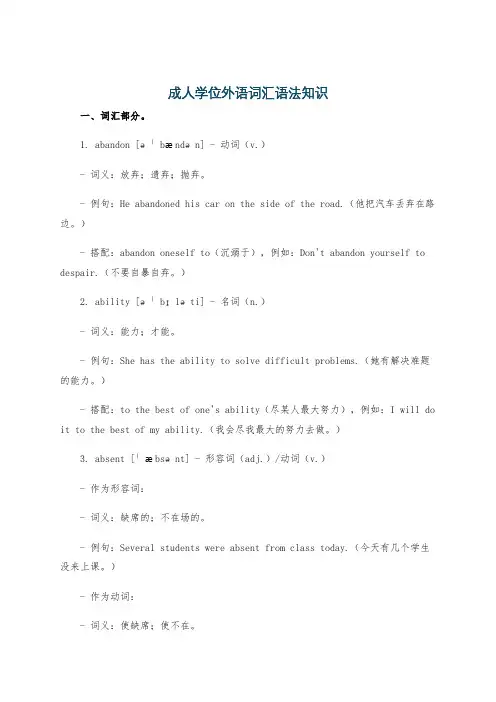
成人学位外语词汇语法知识一、词汇部分。
1. abandon [əˈbændən] - 动词(v.)- 词义:放弃;遗弃;抛弃。
- 例句:He abandoned his car on the side of the road.(他把汽车丢弃在路边。
)- 搭配:abandon oneself to(沉溺于),例如:Don't abandon yourself to despair.(不要自暴自弃。
)2. ability [əˈbɪləti] - 名词(n.)- 词义:能力;才能。
- 例句:She has the ability to solve difficult problems.(她有解决难题的能力。
)- 搭配:to the best of one's ability(尽某人最大努力),例如:I will do it to the best of my ability.(我会尽我最大的努力去做。
)3. absent [ˈæbsənt] - 形容词(adj.)/动词(v.)- 作为形容词:- 词义:缺席的;不在场的。
- 例句:Several students were absent from class today.(今天有几个学生没来上课。
)- 作为动词:- 词义:使缺席;使不在。
- 例句:Love was totally absent from his childhood.(他童年时根本没有得到过爱。
)二、语法部分。
1. 时态 - 一般现在时。
- 构成:- 主语为第三人称单数(he/she/it等)时,动词一般加 -s或 -es,例如:He likes reading.(他喜欢阅读。
)- 主语为其他人称(I/you/we/they等)时,动词用原形,例如:We play football every Sunday.(我们每个星期天踢足球。
)- 用法:- 表示经常或习惯性的动作或状态,例如:She gets up at six every day.(她每天六点起床。
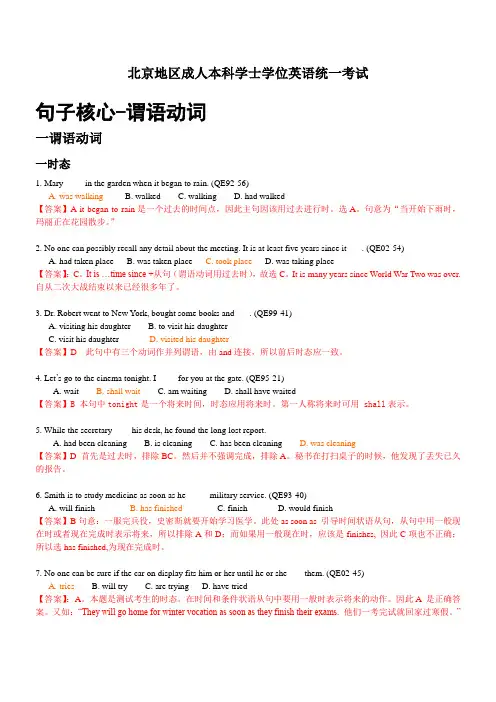
北京地区成人本科学士学位英语统一考试句子核心-谓语动词一谓语动词一时态1. Mary ____ in the garden when it began to rain. (QE92-56)A. was walkingB. walkedC. walkingD. had walked【答案】A it began to rain是一个过去的时间点,因此主句因该用过去进行时。
选A。
句意为“当开始下雨时,玛丽正在花园散步。
”2. No one can possibly recall any detail about the meeting. It is at least five years since it ___. (QE02-54)A. had taken placeB. was taken placeC. took placeD. was taking place【答案】:C。
It is …time since +从句(谓语动词用过去时),故选C。
It is many years since World War Two was over.自从二次大战结束以来已经很多年了。
3. Dr. Robert went to New York, bought some books and ___. (QE99-41)A. visiting his daughterB. to visit his daughterC. visit his daughterD. visited his daughter【答案】D 此句中有三个动词作并列谓语,由and连接,所以前后时态应一致。
4. Let’s go to the cinema tonight. I ____ for you at the gate. (QE95-21)A. waitB. shall waitC. am waitingD. shall have waited【答案】B 本句中tonight是一个将来时间,时态应用将来时。
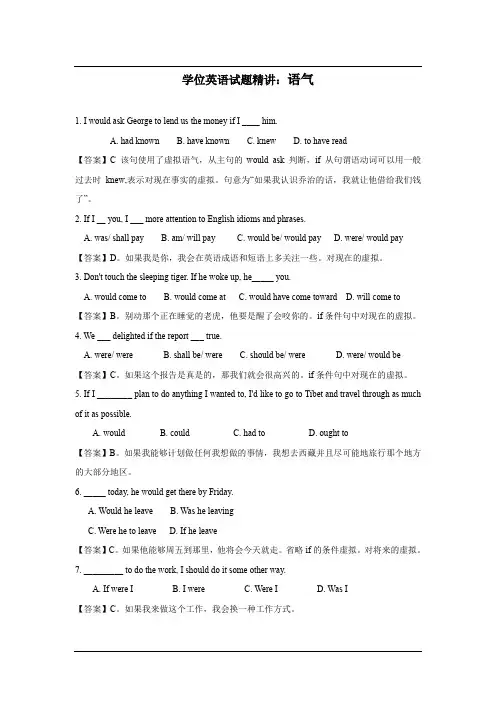
学位英语试题精讲:语气1.I would ask George to lend us the money if I ____ him.A. had knownB. have knownC. knewD. to have read【答案】C 该句使用了虚拟语气,从主句的would ask 判断,if 从句谓语动词可以用一般过去时knew,表示对现在事实的虚拟。
句意为“如果我认识乔治的话,我就让他借给我们钱了”。
2.If I __ you, I ___ more attention to English idioms and phrases.A. was/ shall payB. am/ will payC. would be/ would payD. were/ would pay【答案】D。
如果我是你,我会在英语成语和短语上多关注一些。
对现在的虚拟。
3.Don't touch the sleeping tiger. If he woke up, he_____ you.A. would come toB. would come atC. would have come towardD. will come to【答案】B。
别动那个正在睡觉的老虎,他要是醒了会咬你的。
if条件句中对现在的虚拟。
4.We ___ delighted if the report ___ true.A. were/ wereB. shall be/ wereC. should be/ wereD. were/ would be【答案】C。
如果这个报告是真是的,那我们就会很高兴的。
if条件句中对现在的虚拟。
5.If I ________ plan to do anything I wanted to, I'd like to go to Tibet and travel through as much of it as possible.A. wouldB. couldC. had toD. ought to【答案】B。
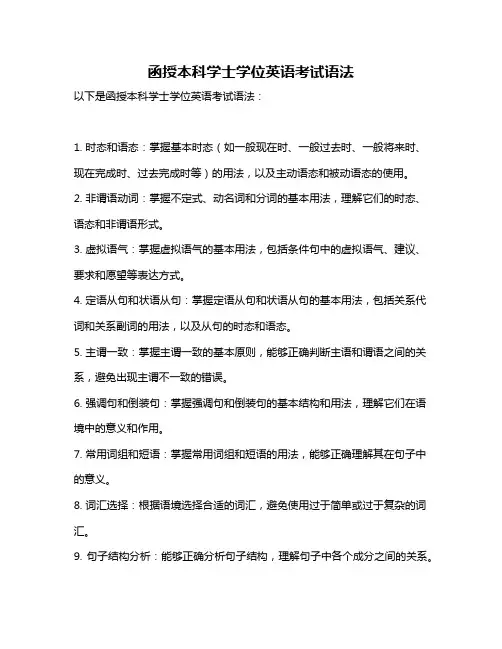
函授本科学士学位英语考试语法
以下是函授本科学士学位英语考试语法:
1. 时态和语态:掌握基本时态(如一般现在时、一般过去时、一般将来时、现在完成时、过去完成时等)的用法,以及主动语态和被动语态的使用。
2. 非谓语动词:掌握不定式、动名词和分词的基本用法,理解它们的时态、语态和非谓语形式。
3. 虚拟语气:掌握虚拟语气的基本用法,包括条件句中的虚拟语气、建议、要求和愿望等表达方式。
4. 定语从句和状语从句:掌握定语从句和状语从句的基本用法,包括关系代词和关系副词的用法,以及从句的时态和语态。
5. 主谓一致:掌握主谓一致的基本原则,能够正确判断主语和谓语之间的关系,避免出现主谓不一致的错误。
6. 强调句和倒装句:掌握强调句和倒装句的基本结构和用法,理解它们在语境中的意义和作用。
7. 常用词组和短语:掌握常用词组和短语的用法,能够正确理解其在句子中的意义。
8. 词汇选择:根据语境选择合适的词汇,避免使用过于简单或过于复杂的词汇。
9. 句子结构分析:能够正确分析句子结构,理解句子中各个成分之间的关系。
10. 阅读理解:掌握阅读理解的基本技巧和方法,能够快速准确地理解文章
的主旨和细节。
11. 写作:掌握基本的写作技巧和方法,能够清晰地表达自己的观点和思想。
以上是函授本科学士学位英语考试语法的主要内容,当然在实际考试中可能还有其他的要求和内容。
建议考生仔细阅读考试大纲,了解考试的具体要求和考试形式,以便更好地备考。
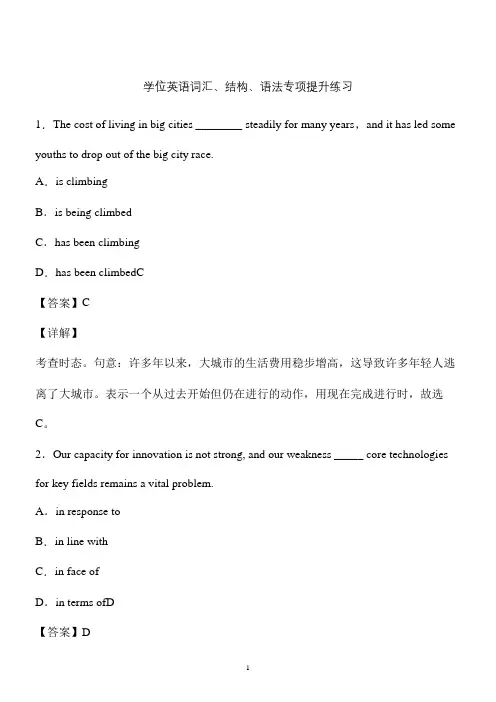
学位英语词汇、结构、语法专项提升练习1.The cost of living in big cities ________ steadily for many years,and it has led some youths to drop out of the big city race.A.is climbingB.is being climbedC.has been climbingD.has been climbedC【答案】C【详解】考查时态。
句意:许多年以来,大城市的生活费用稳步增高,这导致许多年轻人逃离了大城市。
表示一个从过去开始但仍在进行的动作,用现在完成进行时,故选C。
2.Our capacity for innovation is not strong, and our weakness _____ core technologies for key fields remains a vital problem.A.in response toB.in line withC.in face ofD.in terms ofD【答案】D考查介词短语辨析。
句意:我们的创新能力并不强,我们在关键领域的核心科技的弱点依然是个重要的问题。
in response to响应,回答; in line with…与…一致,相符; in face of…面对;in terms of 在…方面。
指在某方面的弱点,故选D。
3.It was nearly a week _______ the rescue team located the crashed plane.A.sinceB.beforeC.untilD.afterB【答案】B【详解】考查时间状语从句。
A. since自从;B. before在……之前;C. until直到;D. after 在……之后。
句意:救援队花了将近一周的时间才找到坠毁的飞机。
北京地区成人本科学士学位英语统一考试句子核心-谓语动词一谓语动词一时态1. Mary ____ in the garden when it began to rain. (QE92-56)A. was walkingB. walkedC. walkingD. had walked【答案】A it began to rain是一个过去的时间点,因此主句因该用过去进行时。
选A。
句意为“当开始下雨时,玛丽正在花园散步。
”2. No one can possibly recall any detail about the meeting. It is at least five years since it ___. (QE02-54)A. had taken placeB. was taken placeC. took placeD. was taking place【答案】:C。
It is …time since +从句(谓语动词用过去时),故选C。
It is many years since World War Two was over.自从二次大战结束以来已经很多年了。
3. Dr. Robert went to New York, bought some books and ___. (QE99-41)A. visiting his daughterB. to visit his daughterC. visit his daughterD. visited his daughter【答案】D 此句中有三个动词作并列谓语,由and连接,所以前后时态应一致。
4. Let’s go to the cinema tonight. I ____ for you at the gate. (QE95-21)A. waitB. shall waitC. am waitingD. shall have waited【答案】B 本句中tonight是一个将来时间,时态应用将来时。
学士学位英语考试语法大全:虚拟语气一、虚拟语气在条件从句中的用法在含有虚拟条件句的复合句中,主从句的谓语都要用虚拟语气,现将其形式列表如下:It is necessary that he (should) be sent to hospital at once. 有必要马上把他送医院。
2.虚拟语气在宾语从句中的用法。
(1)在动词wish后的宾语从句中,表示与现在或过去的事实相反,或对将来的主观愿望,从句通常省略连词that。
a.表示对现在情况的虚拟:从句动词用过去式或过去进行时(be的过去式用were)表示。
如:I wish I knew the answer to the question. 我希望知道这个问题的答案。
(可惜不知道。
)I wish it were spring in my hometown all the year around. 但愿我的家乡四季如春。
(只是愿望,实际根本不可能实现。
)b.表示对过去情况的虚拟:从句动词用had+过去分词。
如:I wish (that) I hadn't wasted so much time. 我后悔不该浪费这么多时间。
(实际上已经浪费掉了。
)He wishes (wished) he hadn't lost the chance. 他真希望没有失去机会。
(事实上机会已经失去了,他感到惋惜。
)c.表示对将来的主观愿望:谓语动词形式为“would/should/could/might+动词原形”,此时要注意,主句的主语与从句的主语不能相同,因为主句的主语所期望的从句动作能否实现,取决于从句主语的态度或意愿(非动作名词除外)。
如:I wish it would stop raining. 但愿雨能停止。
I wish you would be quiet. 我希望你安静一些。
(2)在suggest(建议), demand(要求), order(命令), propose(建议), insist (坚持要做), command(命令), request(要求), desire(希望)等动词后的宾语从句中,谓语动词用“(should)+动词原形”,表示建议,要求,命令等。
成教学士学位英语语法复习重点各种时态一、虚拟语气3. wish后表示与现实相反的愿望时要用虚拟语气。
I wish (that) I had never met her.我要是没遇见过她就好了。
4. would rather(宁愿;宁可)后若加从句则要用过去式表示虚拟语气,也可以直接加do sth宁愿做……。
I would rather go out tonight, if you don't mind. 如果你不介意的话, 我宁愿今晚出去。
5. If引导的条件状语中,表示与现在情况相反的假设,表示与过去情况相反的假设时。
二、定语从句关系词的选择关键要从其在从句中担任着的成分决定的,而不是在主句中的。
非限定性定语从句通常由逗号与修饰的名词相隔开,而且只能由which,who,whom,whose引导,其中which既可以指物,也可以指前面一整句话,这一点大家一定要注意。
另外介词和上面的关键词连用构成符合关系词的情况也很多。
三、反意疑问句可以有两点,句子本身含有否定意义的时候,比如seldom后面用肯定形式的反问。
第二,考察祈使句的反问,对陈述部分是肯定句的祈使句。
第三,I think,I believe,I suppose等表示主观看法的句子,其反意疑问句由后面的宾语从句相对应。
四、倒装句1. only后面加状语,并放于句首时,句子用倒装;而当其修饰其它成分时不倒装。
2. 表示否定意义的副词或短语,如seldom,never,rarely,in no time.3. 注意Hardly/scarcely/barely had sb done…when这一句型,表示一——就…(as soon as后不加倒装)五、主谓一致1. 当主语后跟有with,together with,as well as,but ,except等短语时,谓语动词与前面的主语一致。
2. 表示时间,距离,金钱,速度等的数量词作主语时,通常将其看作是一个整体,为单数。
成⼈学位英语常考语法总结第⼀节动词的时态考试重点:⼀般现在时(i f 从句和a s s oo n as从句);进⾏时表将来;现在完成时和现在完成进⾏时的区别;完成时瞬间动词以及ha v e (ha s)b e en, ha v e(ha s)go n e的区别;过去完成时的时间状语;将来完成时。
⼀、⼀般现在式:1、表⽰经常发⽣的动作或存在的状态:常和a l w ays, u s u al l y, o ft e n ,s o m et i m e s,e v e r y d a y,e v e r y w e e k的等时间状语连⽤。
例:H e go es t o wo r k ev e r y d a y.他每天去上班。
2、表⽰普遍的真理。
由于是众所周知的客观事实,所以⼀般不⽤时间状语。
例:Th e e a rt h i s ro un d. 地球是圆的。
3、有些表⽰⼼理状态或感情的动词往往⽤⼀般现在时。
例:I d o n’t t hi nk yo u a r e ri ght.我以为你错了。
4、在时间、条件状语从句中表⽰将来的动作:常⽤的连词有a s s oon as,w h en,t i l l,i f。
(1)Th e y w i l l go h om e f or w i nt er vo c at i on as s o on as t h e y ________t h ei r ex am s.A. h a v e fi ni s he dB. fi ni shC. fi ni sh edD. w a s fi ni shi n g(答案:B)(1996年22题)(2)W h en t he m i x t u r e ______, i t wi l l gi v e o f f a p ow e r f ul f o r ce.A. w i l l h e atB. wi l l b e h ea t e dC. i s h e at edD. h a s he a t ed(答案:C)(1992年59题)⼆、⼀般过去时:1、表⽰过去的动作或状态:常和过去时间状语连⽤。
学位英语语法高频考点小结(2)虚拟语气如果所表示的条件根本不可能实现或实现的可能性很小时,称为虚拟条件句。
考试重点:虚拟语气的基本形式和用法;if的省略形式;含蓄条件句;以wish(that)引导的表示“愿望”的宾语从句;would rather 引导的从句;以as if, as though 引导的从句;以suggest, advise, insist 等词后引导的宾语从句;It is necessary(important)that引导的主语从句;It is time (that)…句型中.一、虚拟语气的基本形式和用法:虚拟(条件)语气中,主句与从句中谓语动词的形式可分为下面三类:1、I would ask George to lend us the money if I _____ him。
A. had knownB. have knownC. knew D。
know(答案:C。
与现在的事实相反,从句用过去时)(1995年38题)2、Do you think there would be less conflict in the world if all people _____ the same language?A. spoke B。
speak C. had spoken D. will speak(答案:A。
与现在的事实相反,从句的谓语动词用过去时。
)3、If Bob____ with us,he would have had a good time.A. would come B。
would have come C. had come D. came(答案为C。
与过去的事实相反,从句的谓语动词用过去完成时.)(1995年59题)二、if的省略形式在虚拟条件句中,如谓语包含were ,had,should等词,则可以把这些词放到主语前面,省略if。
1、_____ you were busy, I wouldn't have bothered you with my questions。
学位英语试题精讲:语气1. I would ask George to lend us the money if I ____ him.A. had knownB. have knownC. knewD. to have read【答案】C 该句使用了虚拟语气,从主句的would ask 判断,if 从句谓语动词可以用一般过去时knew,表示对现在事实的虚拟。
句意为“如果我认识乔治的话,我就让他借给我们钱了”。
2. If I __ you, I ___ more attention to English idioms and phrases.A. was/ shall payB. am/ will payC. would be/ would payD. were/ would pay【答案】D。
如果我是你,我会在英语成语和短语上多关注一些。
对现在的虚拟。
3. Don't touch the sleeping tiger. If he woke up, he_____ you.A. would come toB. would come atC. would have come towardD. will come to【答案】B。
别动那个正在睡觉的老虎,他要是醒了会咬你的。
if条件句中对现在的虚拟。
4. We ___ delighted if the report ___ true.A. were/ wereB. shall be/ wereC. should be/ wereD. were/ would be【答案】C。
如果这个报告是真是的,那我们就会很高兴的。
if条件句中对现在的虚拟。
5. If I ________ plan to do anything I wanted to, I'd like to go to Tibet and travel through as much of it as possible.A. wouldB. couldC. had toD. ought to【答案】B。
如果我能够计划做任何我想做的事情,我想去西藏并且尽可能地旅行那个地方的大部分地区。
6. _____ today, he would get there by Friday.A. Would he leaveB. Was he leavingC. Were he to leaveD. If he leave【答案】C。
如果他能够周五到那里,他将会今天就走。
省略if的条件虚拟。
对将来的虚拟。
7. _________ to do the work, I should do it some other way.A. If were IB. I wereC. Were ID. Was I【答案】C。
如果我来做这个工作,我会换一种工作方式。
8. Most probably Ally won’t come tomorrow. But if she______ I _____her to call you up at once.A. should come, would askB. come, would have askedC. will come, will askD. is coming, should ask【答案】A。
Ally很可能明天不会回来,但是如果她回来,我会让她立刻给你打电话。
对将来的if条件虚拟。
9. If it ___ tomorrow, what would we do?A. rainsB. were to rainC. would rainD. rain【答案】B。
如果明天下雨,我们做什么呢?对将来的if条件虚拟。
10. If it ___ rain, we ___ get wet.A. is to, shouldB. were to, wouldC. were going to, wouldD. was going to, should 【答案】B。
要是下雨了,我们会淋湿的。
对将来的if条件虚拟。
11. If a better material ____, the strength of the part would have been increased.A. had been usedB. had been usingC. being usedD. using【答案】A 本句考察虚拟语气。
与过去事实相反的假设,从句应该用过去完成时;又因为material 是use 的宾语,应用被动式。
12. If you that night, you might have been too late to get your ticket.A. didn't hurryB. hadn't hurriedC. wouldn't hurryD. hadn't to hurry【答案】B 从给出的主句看,本句为虚拟语气,架设过去已发生的事情,因此从句用过去完成时。
13. With all this work on hand, she ______ to the dance party last night.A. oughtn’t to goB. hadn’t goneC. shouldn’t have goneD. mustn’t have gone【答案】C 原句意思“她手头还有这么多工作,昨晚本不应去参加舞会”,对过去情况的虚拟用“should have done”结构。
14. He abandoned a career that ___ to his becoming one of the most influential people in the world.A. could have ledB. would leadC. should have ledD. must lead【答案】A 本题考查情态动词表示虚拟语气的用法。
与过去事实相反,是could/should have done,本可能/本应该做…(但实际没这样做)。
因为是客观情况,不涉及是否应该,所以选择A could have done.15. If we ____ here ten minutes earlier, we ___ the bus.A. arrived/would catchB. arrived/would have caughtC. had arrived/had caughtD. had arrived/would have caught【答案】D。
如果我们早10分钟到,就赶上公交车了。
If条件句对过去的虚拟。
16. ____ you were busy, I wouldn’t have bothered you with my questions.A.If I realized B. Had I realizedC.Did I have realized that D. As I realized【答案】B 本题考察的是与过去事实相反的虚拟语气.条件状语从句谓语动词用had +过去分词,主句谓语动词用,should/would/could/might +have + 过去分词.当省略if 时,条件从句中的had 提前. 句意是“如果我意识到你这么忙,我就不拿我的这些问题来打扰你了.”17. ___, I should ask them some questions.A. Should they come to usB. If they come to usC. Were they come to usD. Had they come to us【答案】A 本题考查的是省略if的虚拟语气的用法。
从句中的助动词had, were, should等要移至主语之前。
如果他们来到我们身边,我会问他们一些问题。
18. Had the weather been good, the children ___ out for a walk.A. had goneB. could have goneC. would goD. went【答案】B。
当虚拟语气中含有were, had, should, would等词时,可以省略if, 把这些词放在主语之前。
Should I meet her, I would tell her.万一我见到他,我会告诉他的。
Were I in your position, I would do it better.如果我处在你的位置上,我会做的更好。
Had they made preparations, they would have succeeded.如果他们准备了的话,他们应该能成功的。
本句为和过去的事实相反的虚拟语气,因此选B。
19. ___ today, he would get there for holiday.A. Was he leavingB. Were he to leaveC. Would he leaveD. If he leaves【答案】B。
如果他今天走的话,他就在那里度假了。
对将来的虚拟。
20. We ___ our lives had it not been for the policeman.A. would have lostB. should loseC. might loseD. could have lost【答案】A。
要不是警察,我们都已经没命了。
从句对过去,主句对现在。
21. He was very busy yesterday; otherwise he______ to the meeting.A. would have comeB. would comeC. could comeD. had come【答案】A 本句考察虚拟语气。
“如果他不是很忙的话,昨天就去开会了”,事实是他没有去开会,所以是与过去事实相反的假设,主句应该用过去将来完成时,因此选A项would have come.22. Without your help, we ____ so much.A. didn’t achieveB. would not have achievedC. will not achieveD. don’t achieve 【答案】B 本题考察的是虚拟语气. without your help = if you had not helped us,表示与过去事实相反,主句谓语动词用should/would/could/might + 动词原形.故选B. 句意是“如果不是你帮助我们,我们就不会取得这么大的成就.”23. Something must have happened on their way here. Or they ___ by now.A. should have arrivedB. should arriveC. would have arrivedD. would arrive 【答案】C。